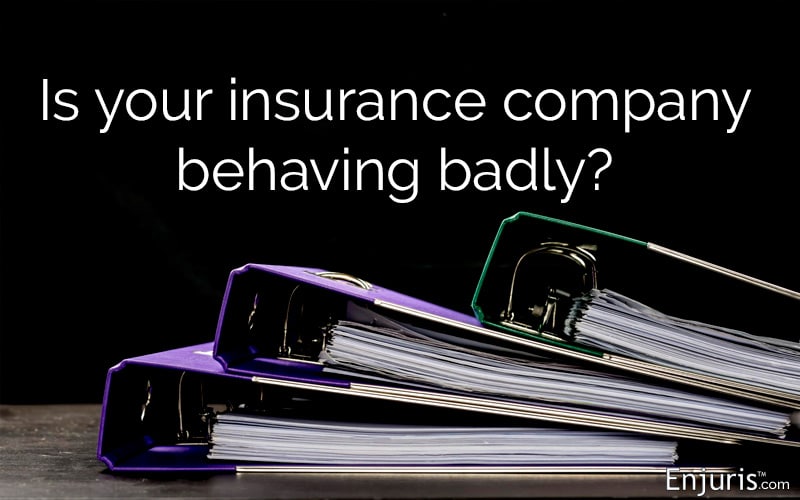
How to identify insurance “bad faith”
Filing an insurance claim? If so, that means something has already gone wrong.
By the time you file an insurance claim, you’ve already experienced some kind of loss or injury, and you need insurance money quickly so that you can repair, replace, or treat whatever problem you’re having. If you find out that your insurance company isn’t protecting you as it should... well, then you’re in even more of a bind.
Insurance “bad faith” is when an insured person or business has purchased a policy and paid premiums so that they will be protected if a loss occurs, but the insurance company refuses to pay the claim, even though it’s covered under the policy.
There are two kinds of bad faith claims:
- First-party. A first-party insurance claim is when the insurance company refuses to pay or investigate a claim that you make for a loss that you sustained (for example, a homeowner’s insurance claim for damage to their house, or a car insurance claim for damage to their vehicle).
- Third-party. A third-party insurance claim is when someone sues you, and your insurer doesn’t adequately defend, indemnify, or settle the claim in order to protect you from a liability judgment.
How do I know if my insurer denied a claim in bad faith?
Your insurance company has a duty to pay claims, as long as the loss is something that’s covered under your insurance policy. You are entitled to the following:
- A quick response. The insurance company must pay or deny the claim within a reasonable period of time. The insurer cannot refuse to answer your questions or make you wait an excessive amount of time for responses. It also may not delay the time for responding to a claim or come up with unreasonable ways to extend the claim period (like requiring additional documents in order to slow the process).
- An explanation. The insurer must also explain to you why it’s denying a claim (if it decided to do so) and how its decision is supported by your policy. For example, if your homeowner’s insurance policy covers flooding that’s a result of a burst pipe, but not flooding caused by heavy rain, it’s reasonable to have an expert show that your flood was, in fact, the result of a burst pipe. If the insurer still refuses to cover a claim, the company needs to be able to point to why they will not cover the loss.
- An effort. If the loss is a lawsuit against you, the insurer has an obligation to attempt to reach settlement of a valid claim so that you can avoid a liability judgment.
An insurer may not:
- Intentionally give bad advice to the insured
- Deny payment of a claim that’s legitimate and covered under their policy
- Refuse to pay a settlement or judgment without a valid reason
- Fail to investigate the damage that is the subject of a claim
- Delay payment of a claim
- Intentionally undervalue the property involved in the claim
- Discount the amount of the claim without a legitimate reason
- Refuse to defend a lawsuit when it’s legally required to do so
Example of bad faith in Georgia
Whiteside v. GEICO Indem. Co. is a recent Georgia bad faith case that resulted in a federal court judgment against insurer GEICO.
Facts: Terry Guthrie was struck by an SUV while riding his bicycle. It wasn’t disputed that the driver of the SUV was at fault for the crash, and Guthrie didn’t have medical insurance at the time. His lawyer contacted GEICO, which was the insurer for the SUV driver, and offered to settle for the policy limits. GEICO refused and offered to settle for a much lower amount. Doing so would expose its insured (the SUV driver) to additional financial risk.
Outcome: A lengthy and complicated court battle resulted in a $2.763 million award to Mr. Guthrie as a result of GEICO’s bad faith in failing to protect its insured.
Why would an insurance company act in bad faith?
Usually, the answer is money.
It’s an unfortunate fact of life that many businesses, including your own insurance company, would rather save money by avoiding payments to their customers than do the right thing. Sometimes, though, bad faith cases can arise from negligence in successfully negotiating a settlement.
But, an insurance policy is a contract. If you’ve done your part by paying insurance premiums, the insurer needs to do its part, too.
What if I experience insurance bad faith?
If you experience insurance bad faith, you need to make sure you’re looking at the situation objectively. If you’re dealing with a loss, you probably already have a lot of stressors on your mind. It’s easy to become frustrated by a process that involves a lot of documents, multiple people, and some level of negotiation. It’s possible your claim will take some time, and the number your insurer comes back with might not be exactly what you were hoping to see. But that doesn’t necessarily mean that your insurance company is acting in bad faith.
However, if you do think there’s bad faith on the part of your insurer, you should beware of common insurance adjuster tactics and consult an experienced attorney. Be prepared to present every document you’ve completed, any correspondence sent to you, and all facts that you’re able to provide. The lawyer might ask for dates and times when you’ve called or emailed the adjuster, along with other details. The more you can supply, the better case you can build.
You might also consider contacting the Georgia Office of Insurance and Safety Fire Commissioner, which is the state agency that handles complaints against insurance companies in Georgia.
Last but not least, you can find a knowledgeable Georgia personal injury lawyer who can help you file a bad faith claim against the insurance company.
See our guide Choosing a personal injury attorney.

